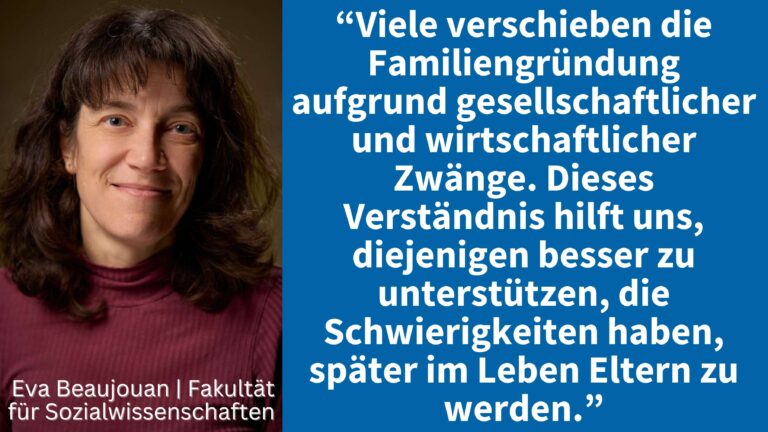World Population Day on the 11 July 2025
In view of the UNFPA’s World Population Day, the PI of the BIC.Late project Assoc.-Prof. Dr. Eva Beaujouan gave a statement on demographic trends, decreasing fertility rates
and new forms of family formation:

Find more information here (in German).
Vienna Yearbook of Population Research
The Special Issue on
“Delayed Reproduction: Patterns, Challenges and Prospects” will be published soon!
The deadline for submissions was the 31 May 2025.
Find more information here.
International Population Conference 2025
13 – 18 July 2025, Brisbane, Australia
The team of BIC.Late organized two sessions in this year’s International Population Conference by the International Union for the Scientific Study of Population in Brisbane.
Find more information here and all presentations by the BIC.Late team
on the Presentations page.
Wittgenstein Centre Conference 2024
21 – 22 November 2024, Vienna, Austria
Delayed Reproduction: Challenges and Prospects
The conference focused on shifting trends, drivers and consequences of delayed reproduction, paying special attention to biological constraints as well as to the impact of assisted reproduction technologies and their potential role in shaping future fertility trends.
Find more information here.
Health Science Forum Vienna 2024
08 October 2024, Vienna, Austria
Wissenschaft trifft Demografie: Reproduktionsmedizin im Spannungsfeld von Ethik und Innovations
This event series of the Health Science Forum Vienna creates opportunities for connecting viewpoints from Researchers, Scientists, Pharmaceutical Specialists and Health Policies to promote exchange and exploration of new perspectives.
Find more information here.
Demografische Forschung aus erster Hand - Demographic Research first-hand
The “Demografische Forschung” is a joint publication by the Max-Planck Institute for demographic research, the Rostocker Zentrum zur Erforschung des Demografischen Wandels, the Bundesinstitut für Bevölkerungsforschung (BiB), the Vienna Institute of Demography/Austrian Academy of Sciences and the Wittgenstein Centre for Demography and Global Human Capital. The team of BIC.Late contributed to the editions in 2023 and 2024.
The New Brochure of the Generations and Gender Programme is out now!
2023
Eva Beaujouan, Ester Lazzari, Marie-Caroline Compans and Shalini Singh all contributed to this year’s GGP brochure on the topic of “Families in Austria. Partnerships, fertility intentions and economic situation in challenging times”
Find the brochure here.
The trend towards ever-later fertility is associated with a growing risk of experiencing fertility problems and of seeking medical help. Medically assisted reproduction (MAR) also facilitates the realization of fertility desires for same-sex couples and single women and men – groups for whom it is difficult to have children without medical help. The number of MAR-conceived children and of MAR families is thus increasing and so is the diversity of family forms in the global North. Fertility and family research is only starting to take infertility and MAR into account to better understand fertility intentions, behaviors (such as contraceptive use) and outcomes over the life course. Yet, the patterns of change and the mechanisms behind new reproductive behaviors as well as their consequences have not been fully explored and understood, particularly in Europe. The EAPS Working Group aims at:
- fostering research on infertility and medically assisted reproduction, its causes and consequences.
- connecting researchers across Europe and beyond who share an interest in the topic and stimulate collaborations.
- facilitating the dialogue between qualitative and quantitative research as well as from the various disciplines engaged in research on infertility and medically assisted reproduction.
- discussing specific topics such as research data, teaching, and communication about research findings.
